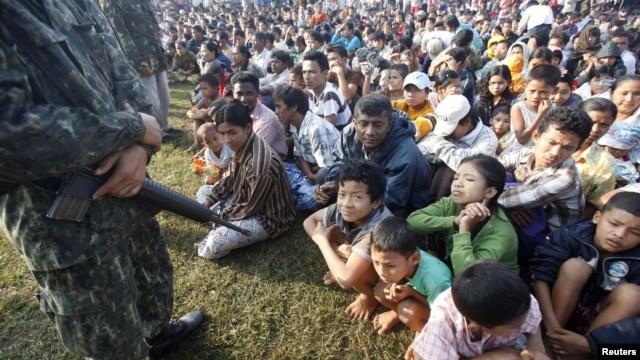A
Thai soldier stands guard as refugees from Burma sit at the Thai-Burma
border town of Mae Sot, waiting to go to refugee camps in Thailand,
November 9, 2010.
BANGKOK, THAILAND — Human Rights Watch
is calling for Thailand to reform its refugee policies in line with
international conventions. Tens of thousands of Burmese refugees are
living in camps inside Thailand.
HRW says Thailand’s refugee policies are often inconsistent, lack transparency and leave many vulnerable to abusive treatment. The independent group's report also says the policies are “not grounded in law.”
Thailand has not ratified the 1951 Refugee Convention and is without a refugee law or functioning asylum procedures. As a result, researchers say the countries takes an ‘ad hoc’ approach in determining policy.
“People are not recognized as being refugees and having the right to
work at the same time," said Bill Frelick, the rights group’s refugee
program director. "So basically, every refugee - whether they are in a
camp or whether they have been recognized in an urban environment by the
U.N. High Commissioner for Refugees for example, is forced to work
illegally. So they are exposing themselves to arrest on the street, to
bribes, to abuse.”HRW says Thailand’s refugee policies are often inconsistent, lack transparency and leave many vulnerable to abusive treatment. The independent group's report also says the policies are “not grounded in law.”
Thailand has not ratified the 1951 Refugee Convention and is without a refugee law or functioning asylum procedures. As a result, researchers say the countries takes an ‘ad hoc’ approach in determining policy.
Thailand-Burma discussions
Thailand has long been considered a refuge for tens of thousands of those fleeing conflict from Vietnam, Cambodia and Laos. There remain more than 140,000 Burmese, mostly Karen, in nine camps along the Thai Burma border.
Recent political and economic reforms in Burma are raising the prospect of their return. There also reportedly are discussions between Thailand and Burma over industrial development programs inside Burma to open the way for a future resettlement.
Human Rights Watch is calling for the camps to be open and to allow those refugees to be retrained and develop skills before returning home. Frelick said this is an important moment.
“We actually, I think, are at a unique historical moment where after decades in which Thailand has basically associated refugees with camps. But the prospects for return are there, and for doing it correctly and for having proper rights respecting repatriation that will work there,” Frelick said.
Pushing for tougher approach
The report said the U.N. High Commission for Refugees needs to take a firmer stand on protecting the rights of refugees when dealing with the Thai Government and also wants the UNHCR to have full access to the refugee border camps.
The report calls for special attention to be paid to the Shan and Rohingya ethnic groups. The Rohingya do not have legal status under Burma’s citizenship laws and Human Rights Watch called for Burma’s government to “immediately recognize or grant citizenship” to them.
Thailand has long been considered a refuge for tens of thousands of those fleeing conflict from Vietnam, Cambodia and Laos. There remain more than 140,000 Burmese, mostly Karen, in nine camps along the Thai Burma border.
Recent political and economic reforms in Burma are raising the prospect of their return. There also reportedly are discussions between Thailand and Burma over industrial development programs inside Burma to open the way for a future resettlement.
Human Rights Watch is calling for the camps to be open and to allow those refugees to be retrained and develop skills before returning home. Frelick said this is an important moment.
“We actually, I think, are at a unique historical moment where after decades in which Thailand has basically associated refugees with camps. But the prospects for return are there, and for doing it correctly and for having proper rights respecting repatriation that will work there,” Frelick said.
Pushing for tougher approach
The report said the U.N. High Commission for Refugees needs to take a firmer stand on protecting the rights of refugees when dealing with the Thai Government and also wants the UNHCR to have full access to the refugee border camps.
The report calls for special attention to be paid to the Shan and Rohingya ethnic groups. The Rohingya do not have legal status under Burma’s citizenship laws and Human Rights Watch called for Burma’s government to “immediately recognize or grant citizenship” to them.


No comments:
Post a Comment